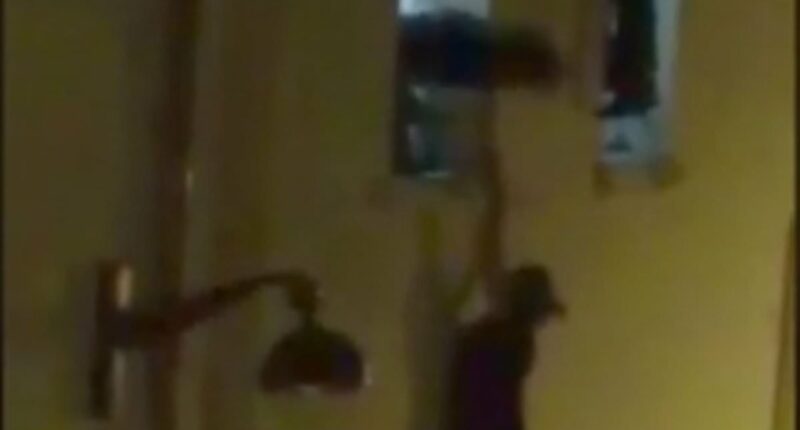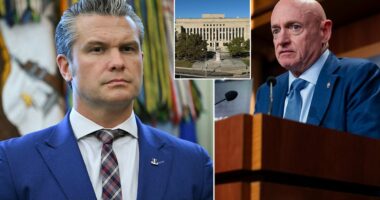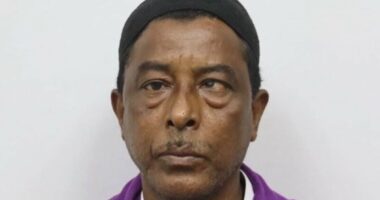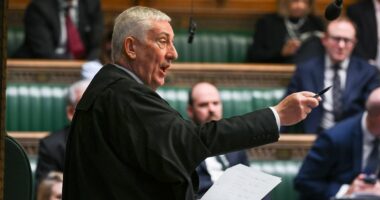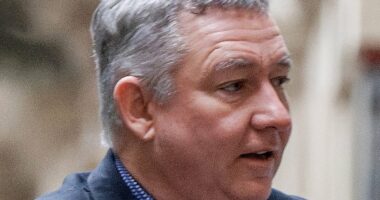Share this @internewscast.com
For the first time in a decade, a pregnant woman who was famously seen hanging from a window during the 2015 Paris terror attacks at the Bataclan theatre has spoken out.
A decade ago, ISIS militants unleashed one of France’s most devastating attacks, targeting cultural landmarks across Paris. The assault claimed the lives of over 130 individuals and left more than 400 injured.
The terrorists struck several bustling restaurants, the Stade de France, and the Bataclan Theatre, where the Eagles of Death Metal were performing that fateful evening.
At the Bataclan, located in Paris’s 11th arrondissement, Charlotte was caught on camera desperately clinging to a window ledge, fighting for survival.
The widely broadcast footage captured the pregnant woman shouting, “Help, help, I’m pregnant, catch me if I fall,” as she held onto the ledge.
Sébastien Besatti, also precariously perched on a window ledge, chose to risk his life to save her. He bravely re-entered the Bataclan to pull her to safety.
Charlotte, who has refused to give her last name, told Le Monde that she refused to allow the terror attack to define her life, but said Sébastien was now part of her life: ‘The Bataclan is not part of my life, but Sébastien is’.
Sébastien, meanwhile, told the newspaper: ‘We’re complete opposites, but she’s my sister in arms’.
He said that he helped her up as he was ‘in a better position than she was’.
The former journalist added: ‘I could have held on and stayed hanging outside, but when I heard her, I decided to step in’.

Sébastien Besatti, also clinging to the facade of the building from a window ledge, decided to risk his own life to help her

The then-pregnant woman was heard pleading in a video, which was seen all over the world, capturing the incident: ‘Help, help, I’m pregnant, catch me if I fall’
But he also admitted: ‘The act of saving her, I did it for myself. I needed it. It reconnected me with my emotions. I began to understand that happiness lies in sharing’.
Sébastien ended up becoming one of many hostages who were taken by the terrorists over an hour after the attack began.
Cops who had entered the building heard him speak. He had been made a spokesman by the terrorists and told the police that there were two gunmen wearing explosive vests holding around 20 of them captive.
He shouted from the other side of the door and asked the officers to stop, saying the captives would be killed or beheaded if the police advanced.
‘They gave us their sermon, their speech, the why they were there,’ Sébastien told RTL radio, describing what the terrorists said.
‘They explained to us that the bombs being dropped on Syria were the reason why they were there. They said they were doing to us Westerners what we were doing to them over there.’
The hostages were ordered to keep guard at the windows, telling the police to stay away.
They were also used as ‘human shields’ and forced to sit by the door, where French cops might have inadvertently shot them.

American rock group Eagles of Death Metal perform on stage on November 13, 2015 at the Bataclan concert hall in Paris, a few moments before four men armed with assault rifles and shouting ‘Allahu akbar’ (‘God is great!’) stormed into the venue
A tense negotiation began between the gunmen and the police, during which officers were passed a mobile number and spoke to the attackers five times in what would prove to be a futile attempt at diplomacy.
Charlotte and Sébastien revealed they properly met each other a month after the attack, following her husband’s appeal for the identity of the man who had saved his wife.
Sébastien revealed that he didn’t immediately recognise Charlotte, but she had recognised him. She told the newspaper that he ‘had a huge smile, completely out of step with what had happened’.
As soon as they met, they immediately began catching up with each other: ‘I took the opportunity to make her my confidante. She became a close friend’.
Charlotte said she was deeply traumatised by the attack, and took herself to a psychiatric clinic at Sainte-Anne Hospital the day after.
She said she was plagued by nightmares and panic attacks for months after, and that taking the Metro or being in a crowd was next to impossible.
Charlotte also said she refused to appear in court during the trial of the terrorists, only once attending a hearing on the day Sébastien and other victims recounted what happened to them.
The lingering trauma lead her to her making sure to get away with her daughter, born seven months after the attack, her husband and her closest friends every November 13, the anniversary of the attack.

French fire brigade members aid an injured individual near the Bataclan concert hall following fatal shootings in Paris, France, November 13, 2015

People on the streets after one of the deadliest attacks in France’s history
The three gunmen who stormed the Bataclan were identified as Foued Mohamed-Aggad, 23, Omar Ismaïl Mostefai, 29 and Samy Amimour, 28.
All three died during the attack, either by blowing themselves up or gunshots which triggered the blasts. Mostefai, of Algerian origin, was the first to be identified after his severed finger was reportedly found at the site of the Bataclan theatre by French authorities.
Their names appeared in files leaked from the Islamic State militant group, where roughly 22,000 fighters were reportedly identified, with one file for each recruit listing a name, address and other information, according to German media reports.
In 2021, what was then the biggest criminal trial in French history began, to prosecute those guilty of committing the worst terror attack the country has ever seen.
Some 20 men, all suspected Islamic State terrorists, were accused of killing 130 people and injuring hundreds in a special court built to host the ten-month trial.
Five judges heard testimony from over 2,000 witnesses and analysed more than a million pages of evidence.
Fourteen were tried in person and another six in-absentia, presumed either dead or missing whilst fighting for ISIS in Syria.

A man with blood on his shirt talks on the phone next to the Bataclan Theatre in Paris, France, on the morning of November 14, 2015

A man kneels as he pays tribute to victims near the site of the attack at the Bataclan concert hall in Paris, November 16, 2015

People pay their respects to victims in front of the Bataclan concert hall as Paris is marking the 10th anniversary of terrorist attacks that killed 132 people and injured hundreds on Thursday, November 13, 2025, in Paris
Salah Abdeslam, the only surviving attacker from the group, was sentenced to a rare full-life sentence.
The court found that his explosives vest malfunctioned, dismissing his argument that he abandoned the vest because he decided not to follow through with his part of the attack after a change of heart.
Of the defendants besides Abdeslam, 18 were given various terrorism-related convictions, and one was convicted on a lesser fraud charge. Others were given life sentences, while some walked free after being sentenced to time served.
